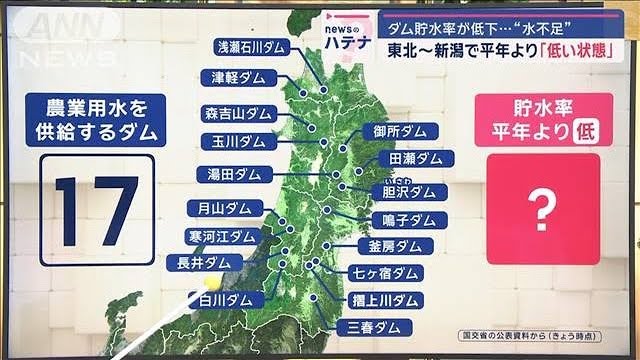TOKYO, Jun 12 (News On Japan) - Concerns about water shortages are spreading across Japan due to declining dam reservoir levels caused by low snowfall in winter and insufficient spring rain.

Meteorologist Ryoko Imamura explains that the water shortage is affecting various regions, particularly in Tohoku, where many dams now have reservoir levels below average.
The situation is worsening in various areas, including Niigata Prefecture in the Tohoku region. On June 11th, the Ministry of Land, Infrastructure, Transport and Tourism released the latest dam reservoir levels.
There are 17 main dams supplying agricultural water in Tohoku, from the southern to the northern regions. As of the 11th, more than half of these dams have reservoir levels below average. Ten dams have lower reservoir levels than usual.
In particular, Naruko Dam (Miyagi Prefecture), Isawa Dam (Iwate Prefecture), and Nagai Dam (Yamagata Prefecture) have 20-30 percentage points less water compared to average levels. The situation at Nagai Dam is unprecedented.
The causes are the lack of snow in winter and the overall shortage of rainfall in spring, affecting the entire region.
Signs of the rainy season are beginning to appear. In the southern part of Tohoku, the average start date for the rainy season is the 12th. Although it might be delayed, looking at the movement of the rainy season front, it will remain in the southern seas until the 15th. However, it is expected to gradually move northward and approach land over the weekend.
There is a possibility of the rainy season starting in Western Japan and the Kanto region as early as the weekend. The rainy season front is likely to continue approaching land into next week, increasing the possibility of the rainy season beginning in Hokuriku and Tohoku around the middle of next week.
Source: ANN















